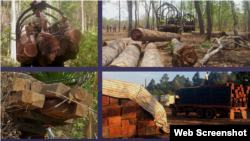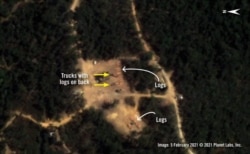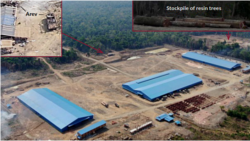The U.S. is pulling its funding for the Greening Prey Lang project, which works to protect the sanctuary from deforestation, and redirecting money for the Cambodian government to civil society groups and communities working to protect the forest.
The announcement, made on Thursday morning, will see the U.S. stop all funding that is going to the Cambodian government because of the worsening deforestation in Prey Lang Wildlife Sanctuary. The $21 million project will now only fund local groups and NGOs working to protect the forest.
“Although Cambodia has made some important strides in environmental protection, the United States has repeatedly expressed concerns about persistent high deforestation rates in protected areas, particularly in the Prey Lang Wildlife Sanctuary where USAID has invested significant resources,” read the statement.
“Unfortunately, the situation is worsening. Since 2016, despite USAID’s support for increased ranger patrols, training of law enforcement, and development of a national protected area management system, the Prey Lang Wildlife Sanctuary has lost approximately 38,000 hectares of forest, nearly nine percent of its forest cover,” it added.
Cambodian forests activists, patrol groups and rights organizations have said the Cambodian government is responsible for inaction over severe forest loss at the Prey Lang sanctuary, with USAID facing criticism for its complicity in funding the Greening Prey Lang project.
The U.S. statement said the Cambodian government continues to silence and target local communities and their civil society partners who are justifiably concerned about the loss of their natural resources.
“As a result of these unresolved concerns, the United States is ending assistance to government entities under the USAID Greening Prey Lang project. This U.S. assistance will instead be redirected to support civil society, the private sector, and local efforts to improve livelihoods and expand climate sensitive agriculture.”
According to the statement, the U.S. has invested more than $100 million in programs to combat environmental issues in Cambodia through USAID funding.
Cambodian authorities have banned the Prey Lang Community Network patrol group from entering the forest last year, claiming they are unregistered under the controversial LANGO law. The group while patrolling the forest also conduct an annual tree blessing ceremony with local civil society groups and environmental activists. This ceremony was blocked last year.
The Prey Lang announcement comes two days after U.S. Ambassador Patrick Murphy met with Environment Minister Say Samal, where the former discussed ongoing concerns regarding deforestation in the Prey Lang Wildlife Sanctuary, according to a post on Twitter.
In March, the U.S. Embassy in Phnom Penh said Ambassador Murphy and USAID Cambodia Mission Director Veena Reddy each met with the country's top environmental officials in separate meetings last year to discuss deforestation and restrictions faced by patrol groups that monitor illegal logging in the sanctuary.
The Prey Lang forest covers approximately 500,000 hectares and spans four provinces – Kratie, Stung Treng, Kampong Thom, and Preah Vihear. More than 250,000 people live in and around Prey Lang, most of whom identify as indigenous Kuy, and the protected area is one of the last, and largest remaining, evergreen forests in the country.
Hoeun Sopheap, a member of Prey Lang Community Network in Kampong Thom province, said funding from the U.S. had not stopped destruction of the forest and that villagers are still prevented from patrolling the protected area.
“USAID’s work is ineffective and not sustainable,” he said. “It doesn’t depend on the U.S. or any other country. Everything depends on Cambodian government’s willingness to protect forests there,” he said.
USAID established the $21 million Greening Prey Lang project in 2018 to promote jobs, protect the sanctuary’s biodiversity and aid forest patrols. But the project has come under criticism for aligning with Cambodia’s Ministry of Environment, which has been accused of turning a blind eye to rampant deforestation.
Environment Ministry Spokesperson Neth Pheaktra said the ministry respected the U.S. decision to end assistance, and that the move only showed that Cambodia was “responsible and strong enough” to protect its own forests.
“There are no longer any large-scale natural resource offenses in Prey Lang Wildlife Sanctuary. There are only small offenses remaining,” he said.
He added that the end of cooperation under the Greening Prey Lang project would “not affect any cooperation between the Environment Ministry and USAID or the U.S. Embassy.”
The end of the deforestation program comes after the U.S. has expressed its displeasure over alleged Chinese military presence at Ream naval base in Preah Sihanouk province, which was raised directly by U.S. Deputy Secretary of State Wendy Sherman in a meeting with Prime Minister Hun earlier this month.
Ek Sovanna, another PLCN representative from Kratie province, said even after spending millions of dollars to protect the forests, there was little progress on stopping the destruction of Cambodia’s natural resources.
“We are the real forest protectors, but we don’t get any funds under that project,” Ek Sovanna said. “Despite providing millions of dollars, it is not a successful development project. The forests are still ruined.”


